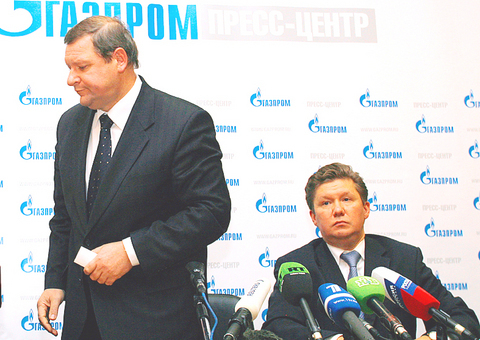Belarus and Russia's natural gas monopoly signed a five-year contract for gas supplies early yesterday, just hours before Russia had threatened to cut off supplies in a price dispute.
Under the agreement, Belarus will pay US$100 per 1,000m3 this year -- a reduction from the US$105 that Gazprom had demanded, according to Gazprom spokesman Sergei Kupriyanov. That is slightly more than double the US$47 Belarus paid last year.
The agreement came after days of increasingly heated discussions that culminated in a session lasting until nearly midnight on Sunday.

PHOTO: AP
"There was a tense atmosphere among the Belarusian delegation since we have agreed to and signed a contract whose conditions for the delivery of gas are not at all favorable," Belarusian Prime Minister Sergei Sidorsky said at a news conference at Gazprom's headquarters.
It was not immediately clear why Gazprom agreed to the lower price for this year. But the contract locks Belarus into agreeing to pay increasing prices over the subsequent four years of the agreement.
The agreement also calls for Gazprom to purchase 50 percent of the shares in Beltransgaz, the Belarusian pipeline network, Kupriyanov said. Gazprom initially had stipulated that Belarus pay US$30 of the new price in Beltransgaz shares, but under the new contract Belarus will pay for all the gas in cash and Gazprom will buy the pipeline shares in cash.
The threatened Russian cutoff had raised concerns in Western Europe about a possible reduction in those countries supplies of Russian gas, much of which reaches Europe through pipelines that cross Belarus.
A similar dispute between Russia and Ukraine early last year resulted in temporary reductions of supplies to Western Europe and raised wide concern about Russia's reliability as an energy partner.
That dispute also brought criticism of Russia for allegedly using its natural resources wealth as a political weapon. But unlike Ukraine, whose president has annoyed the Kremlin by trying to tilt his country Westward, Belarus has had close relations with Russia.
Although the price demanded by Gazprom is well below world market prices for natural gas, it still is likely to be a tough blow to Belarus. The country retains a mostly centralized, Soviet-style economy, and its industries have depended on cheap Russian gas to be competitive.
Subsequent years of the contract are likely to be even tougher. Russia long provided gas to ex-Soviet republics much cheaper than world market prices, but the contract with Belarus locks that country into an obligation to pay gradually increasing prices that will be commensurate with the world market by 2011.
The EU and Germany, which receive some of their Russian gas via Belarus, had urged the neighbors to resolve their dispute quickly and guarantee supplies. Europe is wary of a repeat of the brief supply shortages that ensued when Gazprom halted deliveries to Ukraine during a similar dispute a year ago.

AIR DEFENSE: The Norwegian missile system has proved highly effective in Ukraine in its war against Russia, and the US has recommended it for Taiwan, an expert said The Norwegian Advanced Surface-to-Air Missile Systems (NASAMS) Taiwan ordered from the US would be installed in strategically important positions in Taipei and New Taipei City to guard the region, the Ministry of National Defense said in statement yesterday. The air defense system would be deployed in Taipei’s Songshan District (松山) and New Taipei City’s Tamsui District (淡水), the ministry said, adding that the systems could be delivered as soon as the end of this year. The US Defense Security Cooperation Agency has previously said that three NASAMS would be sold to Taiwan. The weapons are part of the 17th US arms sale to

SERIOUS ALLEGATIONS: The suspects formed spy networks and paramilitary groups to kill government officials during a possible Chinese invasion, prosecutors said Prosecutors have indicted seven retired military officers, members of the Rehabilitation Alliance Party, for allegedly obtaining funds from China, and forming paramilitary groups and assassination squads in Taiwan to collaborate with Chinese troops in a possible war. The suspects contravened the National Security Act (國家安全法) by taking photos and drawing maps of key radar stations, missile installations and the American Institute in Taiwan’s headquarters in Taipei, prosecutors said. They allegedly prepared to collaborate with China during a possible invasion of Taiwan, prosecutors said. Retired military officer Chu Hung-i (屈宏義), 62, a Republic of China Army Academy graduate, went to China

INSURRECTION: The NSB said it found evidence the CCP was seeking snipers in Taiwan to target members of the military and foreign organizations in the event of an invasion The number of Chinese spies prosecuted in Taiwan has grown threefold over a four-year period, the National Security Bureau (NSB) said in a report released yesterday. In 2021 and 2022, 16 and 10 spies were prosecuted respectively, but that number grew to 64 last year, it said, adding that the Chinese Communist Party (CCP) was working with gangs in Taiwan to develop a network of armed spies. Spies in Taiwan have on behalf of the CCP used a variety of channels and methods to infiltrate all sectors of the country, and recruited Taiwanese to cooperate in developing organizations and obtaining sensitive information

BREAKTHROUGH: The US is making chips on par in yield and quality with Taiwan, despite people saying that it could not happen, the official said Taiwan Semiconductor Manufacturing Co (TSMC, 台積電) has begun producing advanced 4-nanometer (nm) chips for US customers in Arizona, US Secretary of Commerce Gina Raimondo said, a milestone in the semiconductor efforts of the administration of US President Joe Biden. In November last year, the commerce department finalized a US$6.6 billion grant to TSMC’s US unit for semiconductor production in Phoenix, Arizona. “For the first time ever in our country’s history, we are making leading edge 4-nanometer chips on American soil, American workers — on par in yield and quality with Taiwan,” Raimondo said, adding that production had begun in recent